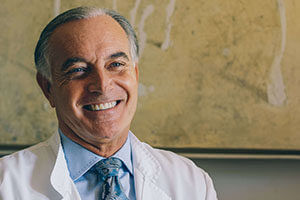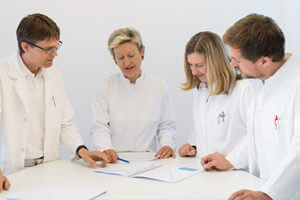Good to know
Here you will find answers to questions that we are often asked and might interest you too. If, after reading, you still have queries or suggestions in addition to the points made below, please let us know.
Basic questions on fasting Medical questions Organisational and practical questions
Can I make a spontaneous decision to come and will I get the room of my choice?
Due to high demand, you are only likely to get the room of your choice in rare cases if you decide to visit us on the spur of the moment, and probably only in the autumn or winter season. To make sure you get a room in the category of your choice, we recommend you book 2 to 3 months in advance. Unfortunately, for logistical reasons, we cannot reserve a certain room, only the requested category – but all of our rooms are equally attractive and comfortable.
What should I consider when packing my case?
If you have a choice of several suitcases, take a smaller one; one of the luxuries of fasting is that you don’t need much and have no need for any additional ballast. You should therefore travel lightly. However, you should include the following things:
- warm clothes (depending on the clinic and time of year: sweaters, socks, scarf), hiking gear and shoes
- indoor sports shoes with a light-coloured sole if possible
- rain gear
- sports and bathing wear (European bathing wear!)
- comfortable clothes for everyday wear
- an elegant garment just in case (e.g. concerts, theatre)
- your (new?) diary
- books you have long wanted to read
- your favourite music and a pair of comfortable headphones
- recent medical reports as well as prescribed medication in sufficient quantities (or else a prescription from your personal doctor)
Will my performance be restricted through therapeutic fasting or are there any other reasons for not working during my stay at BuchingerWilhelmi?
In the past, we have had many examples of guests who managed to write a novel or a film script, and then again others who arrived with a whole case full of heavy files and took them home again unopened. If you can afford to do so, come to us without the pressure of work! Treat yourself to the freedom of doing whatever you want to.
Can I bring a pet or is this not allowed in the clinic?
No, unfortunately, for reasons of general hygiene and to respect the needs of those with allergies, you are not permitted to bring animals with you.
Can I bring somebody with me who does not want to use your services?
Yes, we welcome guests as visitors for up to 3 days. From the 4th day onwards they are considered patients and are required to take part in our medical and therapeutic programmes.
I only have very little time and would like to simply relax for a weekend. Is that possible at BuchingerWilhelmi?
We would be delighted to welcome you for a weekend stay to enable you to get to know us and our services. But to enjoy the full benefits of our refreshing and salutary treatments, we recommend you visit us for at least a week, or two if you want to fast.
Can I watch television and use the internet in my room whenever I want?
Of course, you can do both if you wish: All rooms have Wi-Fi access and we provide a television at an extra charge. But to fully savour the experience of therapeutic fasting, we strongly recommend you abstain from using the internet, TV, radio and telephone. Close your ears to the noise from the world outside, listen to your heart and to the chords that resound in a new and undistorted way through experiencing art, culture and nature during fasting.
Do the services differ according to the room category?
No, the price difference between the room categories refers solely to the position, size and features of the room, and not the therapeutic or other services included.
What do the different packages available at Buchinger Wilhelmi include?
The price of our packages includes a whole array of services: medical consultation, 24-hour nursing care, basic laboratory examination (from a 10-day stay), fasting provisions in the form of various kinds of water and tea, fresh juices and vegetable consommés, and a voucher for different therapies and treatments. The various activities in our weekly programme and the use of our facilities are also included in the packages. The voucher is included in most of our packages, buts its value depends on how long you stay. For a detailed price list, see here:
When should I arrive? When can I move into my room and with whom can I discuss the details of my stay?
On your arrival day your room will be ready for you from 16.00. Our Public Relations team will welcome you and be at your complete disposal to make you familiar with our services and facilities and answer any questions you may have. Please let us know in advance if you wish to talk to a doctor on the day of arrival so that your programme can start immediately.
If medical questions arise while preparing for my stay, can I contact one of your doctors directly?
You may of course contact us in confidence whenever you want to know anything or have questions regarding medical issues. On request, we can arrange an appointment by phone with the doctor, who can answer your questions. Please send us your request via our “Medical request” contact form.
Extreme weight loss is said to increase the risk of gall stones and bilious attacks. Is that true for fasting too?
In the case of extreme measures to achieve weight loss – gastric banding or protein diets – the formation of gallstones was observed to increase by 8 % after a period of four weeks, and by 20 to 35 % after some months of losing weight. We have no knowledge of the formation of gallstones after therapeutic fasting – perhaps because it seldom lasts longer than 3 to 4 weeks and only natural substances are used as supplements.
It is said that rapid weight loss with strict diets can cause gout. Is that true for fasting?
Under professional medical supervision and care, gout attacks are extremely rare. A sufficient intake of fluids, adhering to the elementary rules of fasting as well as observing laboratory results and – if necessary – administering supplementary substances to high-risk patients all help to reduce painful gout attacks.
If I hardly eat anything but continue excreting, does this affect the balance of minerals in my body?
Don’t worry, the loss of minerals that are essential to the body during fasting is prevented by the body`s own reduction processes. Additionally, the fresh fruit and vegetable juices you are given as supplementary nutrition during fasting sustain the body with sufficient amounts of potassium and other minerals. Even so, some of the following symptoms may arise: low blood pressure, dizziness, headaches, fatigue, dry skin and membranes, halitosis, and a heightened sensitivity to cold. These symptoms normally disappear spontaneously or can be treated with other naturopathic remedies: Black tea, honey, warm baths and compresses, Kneipptreatments, physical activity, and the activation of excretory processes via the bowels, kidney, skin and lungs. Many fasting patients have no complaints at all, and the majority experience a heightened feeling of physical and spiritual wellbeing.
Does the heart muscle lose proteins during fasting? What effect does this have?
It is quite normal to use small quantities of protein during fasting and this is unproblematic, even in the case of heart muscle. Methodically correct fasting improves the performance capacity of the muscles, including the heart muscle. This is even more the case when the patient follows a supportive exercise and fitness programme. People fasting usually feel fitter, can move more freely, and progress to higher fitness levels in walking and gymnastics groups. From the animal kingdom we know that migratory birds flying over oceans and deserts neither eat nor drink during this extremely strenuous physical activity. It was discovered that they not only use protein muscle cells from their wings during these flights, but also from the heart muscle. Their heart shrinks by up to 20% without their physical performance suffering in the least.
Can therapeutic fasting have such a debilitating effect on me that health issues result?
Therapeutic fasting under medical supervision is not dangerous; on the contrary, it is an effective treatment for metabolic diseases and many so-called diseases of affluence such as obesity and high blood pressure, reducing further risk factors. Fasting has been shown to have a very positive effect on rheumatism, asthma, allergies and migraine, to name just a few.
Does the dreaded yo-yo effect apply to fasting, as it does to other methods for losing weight? Do supplementary protein drinks help?
It is natural for your body to regain weight after you stop fasting. Whether or not it does this in excess, however, does not depend on protein drinks or other supplements, but on how well you prepare yourself for a healthier lifestyle after fasting. According to our clinical statistics, after fasting ten times – approximately once a year, as recommended traditionally – a third of our regular patients weighed less than they had when they first fasted, another third weighed more or less the same, and only the final third was unable to avoid weight gain, although this was mostly insignificant. By the way, periodical weight loss and gain is not unusual in nature and is part of the natural rhythm of many developed life forms: They store fat when nourishment is available and live on their fat reserves during times of the year when food is less readily available. They do not generally become fatter during the year. In addition, fasting makes it easier to change to a new healthier lifestyle, which can have a positive impact on your weight in the long term.
What weight loss can I expect? Are there any statistics?
It is not possible to specify in advance exactly how much weight you will lose. Weight loss varies and depends on many factors such as your age, build and weight, gender, nutritional habits, the amount you exercise and your ability to relax. Very obese patients generally lose around 200 to 500g/day. But if you are fasting for other reasons, for example due to a chronic inflammatory disease, your weight loss can be decelerated by taking a few fasting supplements without mitigating the positive effects of fasting.
Does fasting facilitate weight loss or prevent further weight gain?
Men aged between 30 and 40 and post-menopause women inevitably tend to gain weight. Fasting can interrupt this tendency. Many people keep their normal weight through fasting or counter the tendency to gain weight by following a regular, professionally supervised therapeutic fasting schedule. When fasting, the primary source of energy right from the start is fat and not protein. It is also true that protein is broken down during fasting, partly from the muscle cells. However, muscle cells are able to release proteins without being harmed in the process. On the contrary: the breaking down of proteins is a reversible phenomenon, and can have a therapeutic effect for certain illnesses. A preliminary loss of fluids occurs during fasting as it does with most other diets. This can be explained on the one hand by the loss of the water bound to glycogens and proteins, and on the other by the desalinating and dehydrating effects of fasting. This has a highly positive effect on high blood pressure and oedemas.
How can fasting help to detoxify a person’s body?
The concept of detox fasting according to Dr Otto Buchingeris a purging process that gives you a feeling of lightness and greater clarity on the one hand and produces physical changes such as cleansed skin, improved breathing, feelings of well-being, and a marked reduction of complaints on the other.
The body is detoxified of certain substances found in excessive quantities in the blood, e.g. cholesterol and other fats, glucose, high fatty deposits, and clots in the arteries and veins. Certain AGEs – advanced glycation end products, or immune complexes – which cause pathogenic illnesses are also eliminated. Medically supervised fasting normalises the blood count and reduces fat deposits in most cases. It is known that extremely low-fat diets can also break down typical arterial sclerotic deposits.
For what indications is fasting recommended?
From a medical viewpoint, fasting makes sense for treating various metabolic diseases such as hyperlipidemia(excess fat in the blood), diabetes mellitus type 2 or metabolic syndrome. It is also indicated for obesity, in particular for patients who want to change their lifestyle permanently. Fasting has also been proven to have a beneficial effect on chronic inflammatory diseases like rheumatoid arthritis or joint disorders like osteoarthritis. Irritable bowel syndrome, migraines, fibromyalgia syndrome and many other diseases can also be influenced by fasting. In animals, fasting has a positive therapeutic effect on various types of cancer. However, as research on humans has not produced comparable results as yet, we do not treat this disease pattern.
Can I enjoy the holistic treatments at BuchingerWilhelmiwithout fasting?
Of course you can take advantage of all our medical treatments and activities as our guest even if you do not fast. Our doctors will put together an individual therapy programme for you incorporating nutrition as an important element. Healthy food can be so tasty!
Apart from the recommended period, is there such a thing as a minimum length of stay for fasting?
To undergo therapeutic fasting in our clinics, you should come for a minimum of ten days. That is the time you need for a digestive rest day before you fast, for the fast itself, and for the refeeding phase after breaking your fast. If you would like to get to know our clinics, give your digestive system a rest or take advantage of our other activities while enjoying our delicious and yet light wholefood cuisine, you may of course visit us for a shorter time.
How long does therapeutic fasting last? Is there a recommended fasting period? What do I need to bear in mind?
The human body requires around 2-3 days to adjust its metabolism to fasting. This is followed by a fasting period lasting several days to several weeks, depending on the patient’s indication and constitution. At the end of the fast comes the refeeding phase. The longer you fast, the longer this refeeding phase should be. A typical length of stay for therapeutic fasting at BuchingerWilhelmiis between two and four weeks. In individual cases, it can make sense to fast for a considerably longer time. Our doctors will discuss with you how long you should ideally fast when you arrive, or, if you prefer, in advance.
Are there different phases during fasting? How long do they last?
If you book a two-week stay at one of our clinics, the procedure for therapeutic fasting is as follows: First your organism is attuned to fasting in a so-called digestive rest day. This involves ingesting approx. 600 calories in the form of fruit and vegetables, mainly carbohydrates with no fat and only very little protein. This is followed by nine days of fasting with fixed routines, accompanying treatments and activities. After breaking your fast, your body gently readjusts from feeding on its inner resources to nourishment from outside in four “refeeding” days. The fast itself can be extended by several days or weeks. To find out more about a typical day’s fasting at BuchingerWilhelmi, see here:
What is meant by supplementary methods and what additional activities and treatments are available?
Buchinger therapeutic fasting is aimed at achieving a holistic sense of wellbeing and is supplemented with a wide range of activities and treatments prescribed by Dr Otto Buchinger for the body, spirit and soul. Read more:






